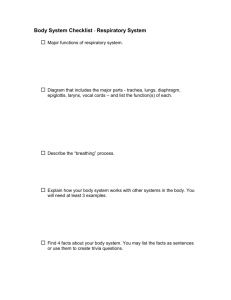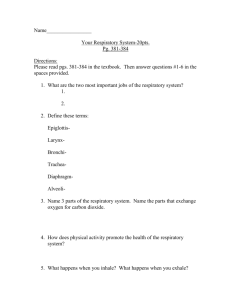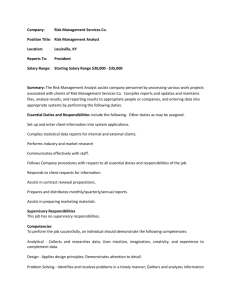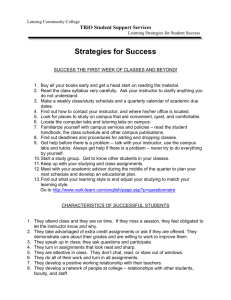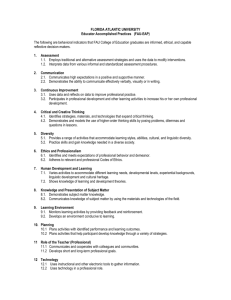Job Title: Director of Clinical Education - Jobs at SJVC
advertisement
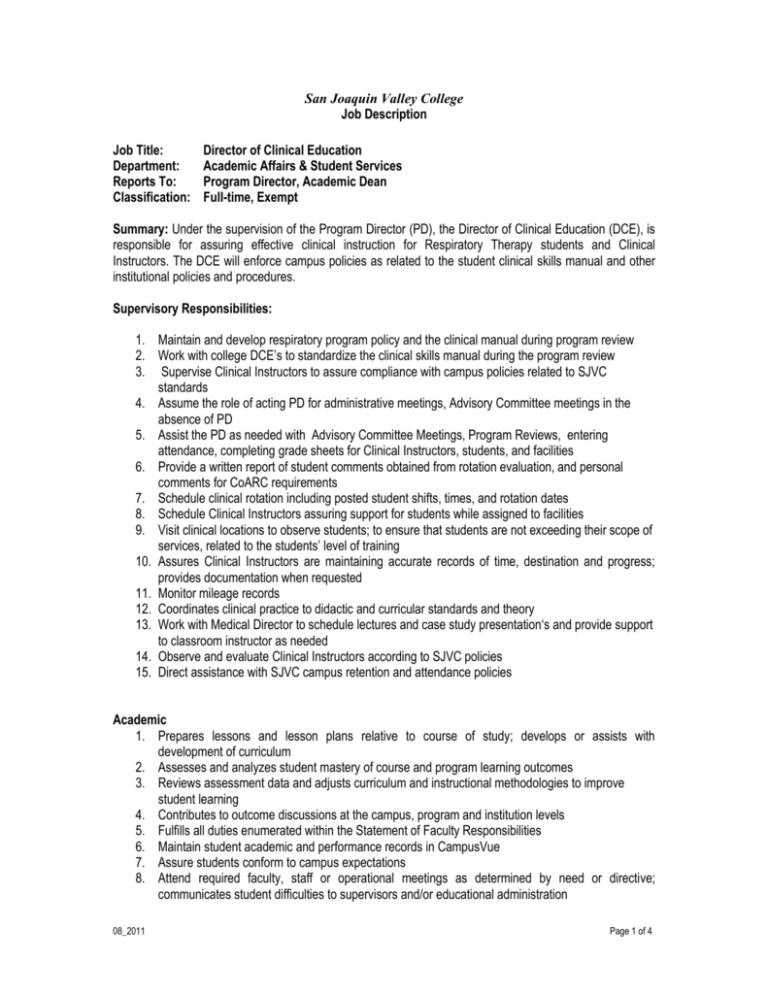
San Joaquin Valley College Job Description Job Title: Department: Reports To: Classification: Director of Clinical Education Academic Affairs & Student Services Program Director, Academic Dean Full-time, Exempt Summary: Under the supervision of the Program Director (PD), the Director of Clinical Education (DCE), is responsible for assuring effective clinical instruction for Respiratory Therapy students and Clinical Instructors. The DCE will enforce campus policies as related to the student clinical skills manual and other institutional policies and procedures. Supervisory Responsibilities: 1. Maintain and develop respiratory program policy and the clinical manual during program review 2. Work with college DCE’s to standardize the clinical skills manual during the program review 3. Supervise Clinical Instructors to assure compliance with campus policies related to SJVC standards 4. Assume the role of acting PD for administrative meetings, Advisory Committee meetings in the absence of PD 5. Assist the PD as needed with Advisory Committee Meetings, Program Reviews, entering attendance, completing grade sheets for Clinical Instructors, students, and facilities 6. Provide a written report of student comments obtained from rotation evaluation, and personal comments for CoARC requirements 7. Schedule clinical rotation including posted student shifts, times, and rotation dates 8. Schedule Clinical Instructors assuring support for students while assigned to facilities 9. Visit clinical locations to observe students; to ensure that students are not exceeding their scope of services, related to the students’ level of training 10. Assures Clinical Instructors are maintaining accurate records of time, destination and progress; provides documentation when requested 11. Monitor mileage records 12. Coordinates clinical practice to didactic and curricular standards and theory 13. Work with Medical Director to schedule lectures and case study presentation‘s and provide support to classroom instructor as needed 14. Observe and evaluate Clinical Instructors according to SJVC policies 15. Direct assistance with SJVC campus retention and attendance policies Academic 1. Prepares lessons and lesson plans relative to course of study; develops or assists with development of curriculum 2. Assesses and analyzes student mastery of course and program learning outcomes 3. Reviews assessment data and adjusts curriculum and instructional methodologies to improve student learning 4. Contributes to outcome discussions at the campus, program and institution levels 5. Fulfills all duties enumerated within the Statement of Faculty Responsibilities 6. Maintain student academic and performance records in CampusVue 7. Assure students conform to campus expectations 8. Attend required faculty, staff or operational meetings as determined by need or directive; communicates student difficulties to supervisors and/or educational administration 08_2011 Page 1 of 4 9. Promote a positive role model to students; promotes a positive image to the public relative to campus programs and pursuits 10. Assess student progress, makes suggestions for improvement; assures accessibility and availability for students while in designated clinical sites 11. Communicate progress and/or student difficulties to program faculty in a timely manner 12. Maintain awareness for student safety, building and resource security, and hazards prevention; reports unsafe or suspicious activities to supervisors in a timely manner 13. Maintain equipment and consumable supplies; communicates equipment and supply needs to the Program Director 14. Perform other duties as assigned Competency: To perform the job successfully, an individual should demonstrate the following competencies: Problem Solving – Identifies and resolves problems in a timely manner; gathers and analyzes information skillfully; develops alternative solutions; works well in-group problem solving situations; uses reason even when dealing with emotional topics. Project Management – Develops project plans; coordinates projects; communicates changes and progress; completes projects on time and within budget; manages project team activities. Technical Skills – Assesses own strengths and weaknesses; pursues training and development opportunities; strives to continuously build knowledge and skills; shares expertise with others. Customer Service – Manages difficult or emotional student/faculty situations; responds promptly to student and faculty needs; solicits student and faculty feedback to improve service; responds to requests for service and assistance; meets commitments. Interpersonal Skills – Focuses on solving conflict, not blaming; maintains confidentiality; listens to others without interrupting; keeps emotions under control; remains open to others’ ideas and tries new things. Oral Communication – Speaks clearly and persuasively in positive or negative situations; listens and gets clarification; responds well to questions; demonstrates group presentation skills; participates in meetings. Written Communication – Writes clearly and informatively; edits work for spelling and grammar; able to read and interpret written information. Teamwork – Balances team and individual responsibilities; exhibits objectivity and openness to others’ views; gives and welcomes feedback; contributes to building a positive team spirit; puts success of team above own interests; able to build morale and group commitments to goals and objectives; supports everyone’s efforts to succeed. Visionary Leadership – Displays passion and optimism; inspires respect and trust; mobilizes others to fulfill the vision; provides vision and inspiration to peers and subordinates. Change Management – Develops workable implementation plans; communicates changes effectively; builds commitment and overcomes resistance; prepares and supports those affected by change; monitors transition and evaluates results. Leadership - Exhibits confidence in self and others; inspires and motivates others to perform well; effectively influences actions and opinions of others; accepts feedback from others; gives appropriate recognition to others. Quality Management – Looks for ways to improve and promote a quality education; demonstrates accuracy and thoroughness. Diversity – Demonstrates knowledge of EEO policy; shows respect and sensitivity for cultural differences; educates others on the value of diversity; promotes a harassment-free environment; builds a diverse workforce. Ethics – Treats people with respect; keeps commitments; inspires the trust of others; works with integrity and ethically; upholds organizational values. Organizational Support – Follows policies and procedures; completes administrative tasks correctly and on time; supports organization’s goals and values, benefits organization through outside activities. 08_2011 Page 2 of 4 Planning/Organizing – Prioritizes and plans work activities; uses time efficiently; plans for additional resources; sets goals and objectives; organizes or schedules faculty and their tasks. Professionalism – Approaches others in a tactful manner; reacts well under pressure; treats others with respect and consideration regardless of their status or position; accepts responsibility for own actions; follows through on commitments. Quality – Demonstrates accuracy and thoroughness; looks for ways to improve and promote quality; monitors own work to ensure quality. Safety and Security – Observes safety and security procedures; reports potentially unsafe conditions; uses equipment and materials properly. Adaptability – Adapts to changes in the work environment; manages competing demands; changes approach or method to best fit the situation; able to deal with frequent change, delays, or unexpected events. Attendance/Punctuality – Is consistently at work and on time; ensures work responsibilities are covered when absent; arrives at meetings and appointments on time. Dependability – Follows instructions, responds to management direction; takes responsibility for own actions; commits to long hours of work when necessary to reach goals; completes tasks on time or notifies appropriate person with an alternate plan. Qualifications: The Director of Clinical Education must be a Registered Respiratory Therapist (RRT) and hold such professional license or certificate required by the state in which he/she employed; must be currently certified in cardiopulmonary resuscitation by the American Heart Association. Must have a thorough knowledge of the specific program requirements, accreditation and approval standards. Education and/or Experience – The Director of Clinical Education must possess a baccalaureate degree, a minimum of four (4) years experience as a Registered Respiratory Therapist, with a minimum of two (2) years working in clinical respiratory care and two (2) years in a teaching position in an accredited respiratory care program. Two years management/supervisory/lead position or clinical specialist experience in Respiratory Care or related health care setting is preferred. Language Skills – Ability to read and interpret documents such as handbooks and curriculum; ability to write routine reports and correspondence; ability to speak effectively before groups of students and faculty members. Mathematical –Ability to add, subtract, multiply and divide in all units of measure, using whole numbers, common fractions, and decimals; ability to compute rate, ratio, and percent. Reasoning Ability – Ability to apply common sense understanding to carry out instructions furnished in written, oral or diagram form; ability to deal with problems involving several concrete variables in standardized situations. Computer Skills – To perform the job successfully, an individual should have knowledge of Microsoft Office, Word, Excel, Access, PowerPoint and Outlook. Specialized Professional Credentials (non-compulsory) Certified Pulmonary Function Technologist (CPFT); Registered Pulmonary Function Technologist (RPFT); Neonatal-Pediatric Specialist [NPS]; Registered Polysomnographic Technologist (RPsgT); or Asthma Educator-Certified (AE-C). Provider for Neonatal Resuscitation Program (NRP); Advanced Cardiac Life Support (ACLS); Pediatric Advanced Life Support (PALS). Physical Demands: The physical demands describes here are representative of those that must be met by an employee to successfully perform the essential functions of the job. Reasonable accommodations may be made to enable individuals with disabilities to perform the essential functions. 08_2011 Page 3 of 4 While performing the duties of this job, the employee is regularly required to stand; sit; use hands to finger, handle or feel; reach with hands and arms; talk; and hear. The employee is frequently required to walk and stoop, kneel, crouch, or crawl. The employee is occasionally required to climb or balance. The employee must regularly lift and/or move up to 10 pounds, frequently lift and/or move up to 25 pounds and occasionally lift and/or move up to 50 pounds. Work Environment: The work environment characteristics described here are representative of those an employee encounters while performing the essential functions of this job. Reasonable accommodations may be made to enable individuals with disabilities to perform the essential functions. The noise level in the work environment is usually moderate. In some cases depending on the program, the employee may be exposed to chemicals and/or moving machinery. 08_2011 Page 4 of 4
